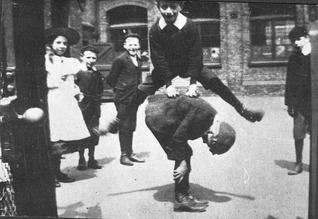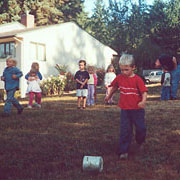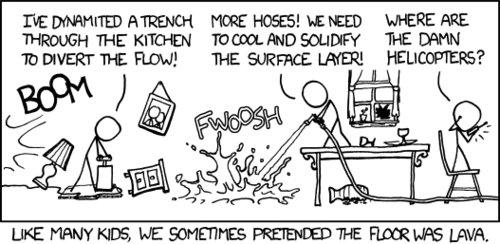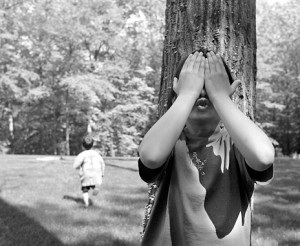I grew up living on a cul-de-sac called Farmdale Way in Maineville, Ohio. It doesn't get more Leave It To Beaver than that.
The surrounding houses each had kids of various ages so that everyone had someone to pass the long summer days with and relay the message that So-And-So's mom was looking for them after it got dark.
We made up some games and relied on old standbys, sometimes convincing our parents to join in for a particularly raucous game of Kick the Can or Red Rover.
If you've played these, maybe you can identify with the following parallels I see between the strategies that helped us win children's games and the attitudes that help you win at life:
The surrounding houses each had kids of various ages so that everyone had someone to pass the long summer days with and relay the message that So-And-So's mom was looking for them after it got dark.
We made up some games and relied on old standbys, sometimes convincing our parents to join in for a particularly raucous game of Kick the Can or Red Rover.
If you've played these, maybe you can identify with the following parallels I see between the strategies that helped us win children's games and the attitudes that help you win at life:
KICK THE CAN:
Actively pursuing a goal
You've got a choice if you're going to win the game. You can either hide behind your neighbor's tree and wait for some other, braver kid make a dash to glory (my once-preferred tactic), or you can peek out, pick a route, and go after the can with all that you've got.
If you make it - you'll congratulate yourself on taking a risk. If you don't, you'll comfort yourself with the knowledge that at least you tried to actually play the game instead of hanging out with a tree for 30-some minutes.
Actively pursuing a goal
You've got a choice if you're going to win the game. You can either hide behind your neighbor's tree and wait for some other, braver kid make a dash to glory (my once-preferred tactic), or you can peek out, pick a route, and go after the can with all that you've got.
If you make it - you'll congratulate yourself on taking a risk. If you don't, you'll comfort yourself with the knowledge that at least you tried to actually play the game instead of hanging out with a tree for 30-some minutes.
RED ROVER:
Playing to your strengths while acknowledging your weaknesses.
Anyone who has ever played Red Rover knows it can be astonishingly violent. Here, we tell kids, your job is to either sacrifice your wrist in barring another kid from barreling through your line OR you're the one hurling yourself at others. Have fun.
You and your teammates consult with each other. Obviously you're not going to call over the Mini-Linebacker who could fell your entire team with a well-timed blow.
And when you've been invited over, you search for the kid who is wiggling, distracted, or looks terrified, and you GUN IT.
Red Rover is about making decisions based on both empirical data (That guy is huge) and hunches (That guy looks scared of being running into him).
Ultimately, the game is about knowing where you stand vis-a-vis obstacles, in terms of your strengths, weaknesses, and taking both into account when tailoring your approach to a challenge.
Playing to your strengths while acknowledging your weaknesses.
Anyone who has ever played Red Rover knows it can be astonishingly violent. Here, we tell kids, your job is to either sacrifice your wrist in barring another kid from barreling through your line OR you're the one hurling yourself at others. Have fun.
You and your teammates consult with each other. Obviously you're not going to call over the Mini-Linebacker who could fell your entire team with a well-timed blow.
And when you've been invited over, you search for the kid who is wiggling, distracted, or looks terrified, and you GUN IT.
Red Rover is about making decisions based on both empirical data (That guy is huge) and hunches (That guy looks scared of being running into him).
Ultimately, the game is about knowing where you stand vis-a-vis obstacles, in terms of your strengths, weaknesses, and taking both into account when tailoring your approach to a challenge.
HOT LAVA:
Creative problem-solving
At home I knew the game as Hot Lava, but in gym class at school it was called "Ford the River." Either way, you had to pretend the floor was off-limits and devise creative methods of traversing it. At school we were racing against the clock too, since gym period was only about 45 minutes.
This was, like, the best game EVER until your mom found you appropriating her throw pillows as stepping stones, squishing your dirty sneaker all over the fabric. It was even better at in gym class where they let you use old tires.
This game was an ongoing equation of will X get us across Y in Z amount of time. Natural leaders emerged - Grab that pillow! Now the lamp! You - hold this while I attach this rope! - and a team-effort fostered a sense of camaraderie for all those involved.
Hot Lava is the closest approximation I can think of as a metaphor for wading through a course where most of the material is new to you. You rely on others for help, but have to assume responsibility for getting yourself across. And the only way you're going to make it safely is by calling on a variety of resources at your disposal.
Creative problem-solving
At home I knew the game as Hot Lava, but in gym class at school it was called "Ford the River." Either way, you had to pretend the floor was off-limits and devise creative methods of traversing it. At school we were racing against the clock too, since gym period was only about 45 minutes.
This was, like, the best game EVER until your mom found you appropriating her throw pillows as stepping stones, squishing your dirty sneaker all over the fabric. It was even better at in gym class where they let you use old tires.
This game was an ongoing equation of will X get us across Y in Z amount of time. Natural leaders emerged - Grab that pillow! Now the lamp! You - hold this while I attach this rope! - and a team-effort fostered a sense of camaraderie for all those involved.
Hot Lava is the closest approximation I can think of as a metaphor for wading through a course where most of the material is new to you. You rely on others for help, but have to assume responsibility for getting yourself across. And the only way you're going to make it safely is by calling on a variety of resources at your disposal.
Of course, there are many more games we could talk about - Hide and Go Seek, jumping rope, hopscotch, four square.... Heck, we ran through a sprinkler and called it a game, even though in retrospect I think it was just hot out and my mom wanted us to stop vegetating in the air-conditioned indoors.
We learn how to lead, follow, strategize, evaluate, plan, and execute from the youngest age through these games.
So if you are doubting your ability to assert yourself in class, play to your strengths, or resolve a problem, just remember that if you could do it on a regular basis at six-years-old, and you can handle it at twenty.
We learn how to lead, follow, strategize, evaluate, plan, and execute from the youngest age through these games.
So if you are doubting your ability to assert yourself in class, play to your strengths, or resolve a problem, just remember that if you could do it on a regular basis at six-years-old, and you can handle it at twenty.






